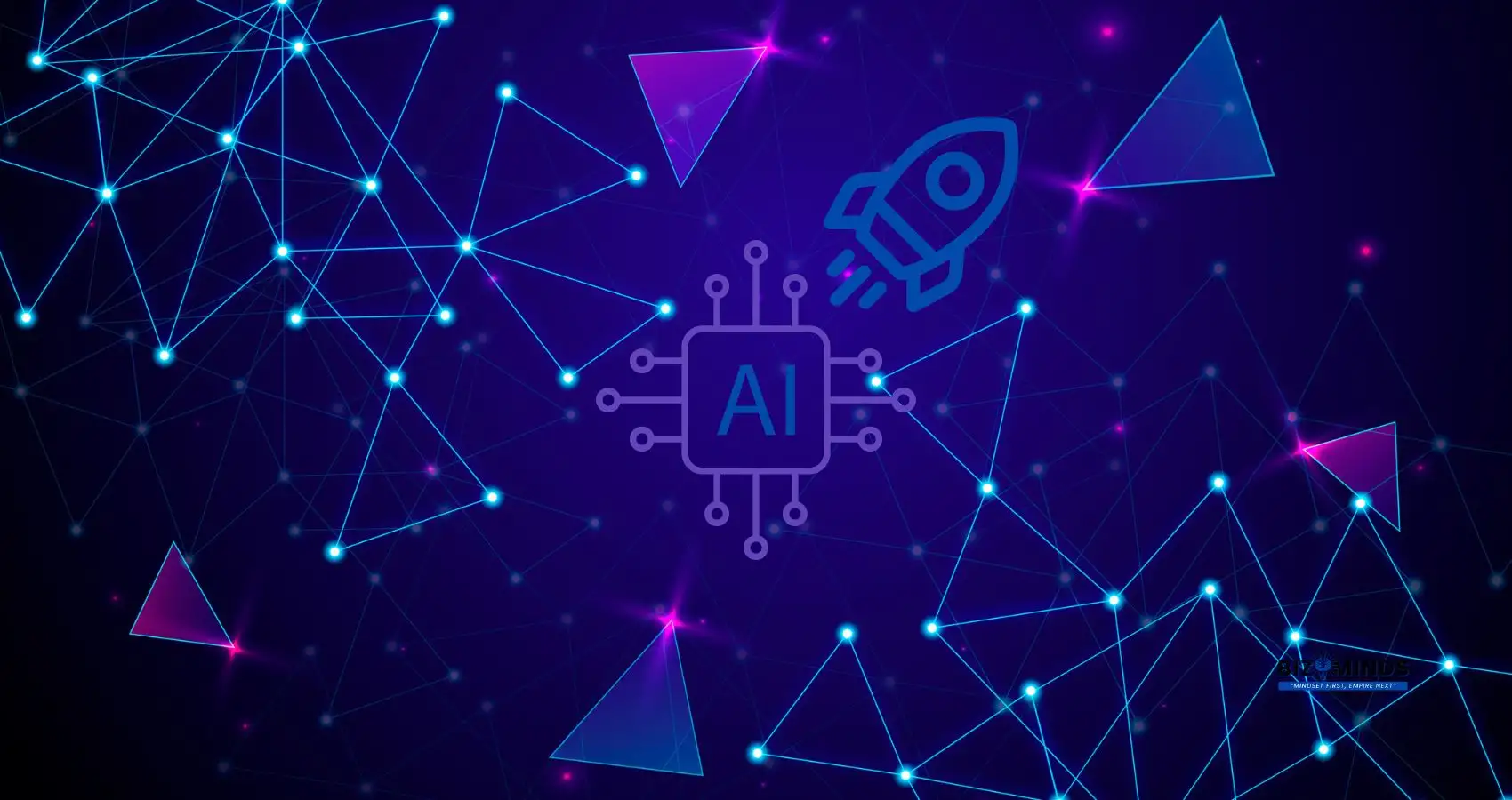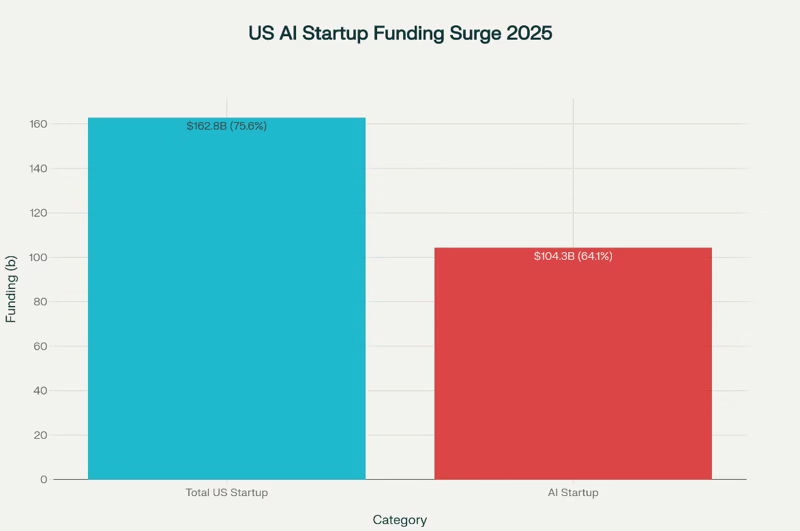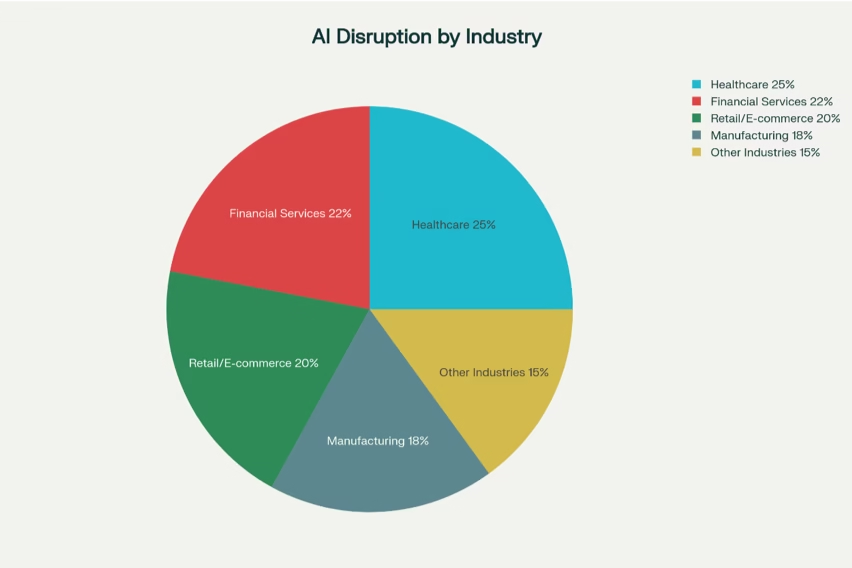
The artificial intelligence revolution isn’t coming—it’s here, and it’s reshaping the very foundation of American business
AI Startups Funding Surge, Indicating The Shift
In the heart of America’s entrepreneurial spirit, a profound shift is unfolding—one driven not by new manufacturing techniques or marketing strategies, but by the power of artificial intelligence itself. As startup founders across the United States harness ever-more sophisticated machine learning models, traditional industries are being reimagined from the ground up. From life-saving diagnostic tools in our hospitals to lightning-fast loan approvals at our banks, and from hyper-efficient retail supply chains to self-optimizing factories in the Midwest, AI-powered startups are rewriting the rules of competition and possibility.
This article explores how these innovative companies are not only securing unprecedented levels of venture capital—over $104 billion in the first half of 2025 alone—but are also forging deeper human connections, delivering personalized experiences, and solving challenges that once seemed insurmountable. Join us as we delve into the stories, statistics, and successes behind America’s AI revolution, and discover how the next wave of industry transformation is being led by the boldest minds in the nation.
The Dawn of America’s AI Revolution
Imagine walking into a hospital where your X-ray is read by an AI that catches cancer earlier than any human radiologist ever could. Picture applying for a loan and getting approved in minutes, not weeks, thanks to machine learning algorithms that understand your financial story better than traditional credit scores. Envision shopping at a store where every product you want is always in stock, perfectly positioned thanks to AI systems that predict demand with uncanny accuracy. This isn’t science fiction—this is the reality that AI startups are creating across America today. And the numbers tell a story so compelling that it’s impossible to ignore.

US AI Startup Funding Surge in First Half of 2025
The Great AI Startups Gold Rush of 2025
In the first half of 2025 alone, something extraordinary happened in American entrepreneurship. As conventional venture capital firms faced fundraising challenges, AI startups drew a remarkable $104.3 billion, accounting for an unprecedented 64.1% of all venture capital transactions. To put this in perspective, this nearly matches the entire $104.4 billion that AI startups raised in all of 2024.
The surge wasn’t just about money—it was about belief. The notion that smaller, more agile firms could gain an edge over corporate giants hampered by old systems and organizational sluggishness.
Davis Treybig, partner at the venture capital firm Innovation Endeavors, explains, “The remarkable growth rates of OpenAI and Anthropic are the underlying reason. If similar rapid advancements are possible in other areas like robotics, protein folding, world models, or video models, it will attract many investors willing to commit significant capital.”
The stars of this revolution have become household names almost overnight. OpenAI, now valued at a mind-boggling $157 billion, hit $13 billion in annualized revenue by July 2025, doubling from $6 billion in January. Their weekly active user base exploded to 700 million people—nearly one in every four Americans. Not to be outdone, Anthropic, the safety-focused AI company behind Claude, secured a $61.5 billion valuation and is already drawing investor interest at over $100 billion. Their revenue climbed from $3 billion to $4 billion in just one month.
Top AI Startups Unicorns & Values
| Company | Valuation | Focus Area |
| Open AI | $157B | Generative AI |
| Anthropic | $61.50B | AI Safety |
| Databricks | $43.00B | Data Analytics |
| Scale AI | $14.30B | Training Data |
| xAI | $10.00B | Assistant |
Why Startups Are Winning the AI Race
But here’s what makes this revolution truly fascinating: it’s not the tech giants leading the charge in every sector. It is ambitious startups with bold visions and powerful algorithms.
Traditional companies face what industry experts call the “legacy trap.” They’re stuck with decades-old systems, risk-averse cultures, and shareholders who value quarterly earnings over quantum leaps. AI startups, on the other hand, are building from the ground up with artificial intelligence as their foundation, not an afterthought.
Take Cursor, an AI coding assistant created by a team of just 20 people. In 21 months, they achieved $100 million in annual recurring revenue—a feat that would make Fortune 500 CEOs weep with envy. Or consider MidJourney, which reached $200 million in ARR within two years with a team of under 12 people. These aren’t flukes—they’re the new normal in an AI-driven economy.

Healthcare: Where AI Meets Human Life
Nowhere is the AI revolution more profound—or more personal—than in healthcare. When Eric Lefkofsky’s wife was diagnosed with cancer, he was shocked by how difficult it was to access high-quality clinical data to guide treatment decisions. His response? He founded Tempus in 2015, a Chicago-based company that uses AI to revolutionize cancer treatment through precision medicine.
Today, Tempus processes vast amounts of clinical and molecular data to help doctors make real-time, data-driven decisions for personalized patient care. The results speak for themselves: patients receiving Tempus-guided treatment often experience better outcomes, including higher response rates and longer progression-free survival.
But Tempus isn’t alone in this healthcare revolution. Zebra Medical Vision, founded in 2014, uses AI to detect conditions like breast cancer and heart disease with accuracy that rivals expert radiologists. Their algorithms have achieved a remarkable 99.2% detection rate for kidney tumors, according to Better Medicine.
PathAI is transforming pathology diagnosis, achieving a 70% reduction in diagnostic errors. In a field where accuracy can mean the difference between life and death, these improvements aren’t just statistics—they’re lifelines. The impact extends beyond individual patients. Zebra Medical Vision’s solutions are now used by healthcare providers in over 50 countries, helping bridge the diagnostic gap between well-resourced and under-resourced healthcare systems. Their FDA-approved AI tools help doctors quickly diagnose serious conditions like brain bleeding and collapsed lungs, providing critical support in emergency situations
Financial Services: Democratizing Access to Capital
For decades, getting a loan in America often felt like playing a rigged game. Your zip code, your school, your first name—factors that had nothing to do with your ability to repay—could determine whether you got the capital you needed to achieve your dreams.
AI startups are rewriting these rules with algorithms that are both more accurate and fairer.
Zest AI assists financial institutions in making smarter credit decisions by analyzing hundreds of data points that go far beyond traditional credit scores. Their AI-driven technology evaluates a much broader range of variables—including credit history, payment behaviors, and other alternative data sources—helping lenders increase loan approval rates while managing risk more effectively. This approach also enables financial institutions to expand lending access, improve automation, and reduce fraud, making credit decisions faster, fairer, and more inclusive. For example, Zest AI models have helped lenders automate 60-80% of lending decisions and increase approval rates without increasing risk.
A credit union COO highlighted the value of Zest AI’s inclusive technology, stating that it helps them understand who they are lending to and the depth of those loans. The technology provides insights into lending patterns to groups such as older people, women, and minorities, which the COO considers crucial to ensuring diversity, equity, and expanded access to affordable credit in their communities. This focus on equitable lending supports the goal of broadening financial inclusion while maintaining responsible lending practices. This viewpoint aligns with testimonials from financial institutions using Zest AI to foster fair and diverse credit access.
Upstart takes a different approach, using AI to consider factors like education and employment history alongside traditional credit metrics. This particularly benefits borrowers with limited credit history or those new to the workforce, resulting in higher approval rates and lower interest rates.
The impact isn’t limited to lending. Pagaya Technologies has improved loan approval accuracy by 35%, while AI-powered fraud detection systems now analyze transaction patterns in real-time, preventing billions in losses before they occur.
Goldman Sachs has adopted machine learning extensively for risk management. Their AI systems analyze vast and complex datasets to identify and assess different types of risks, including market volatility, credit risks, and operational risks. These models enable proactive decision-making by forecasting potential downturns and risky investments, helping the firm safeguard assets and maintain investor confidence. They also use AI to reduce false positives in anti-money laundering alerts and expedite internal audits, improving oversight and efficiency while ensuring regulatory compliance.
Simultaneously, J.P. Morgan’s COiN system leverages AI to process legal contracts in seconds—work that traditionally took thousands of lawyer-hours. This automation enhances speed and accuracy in contract review, significantly reducing manual workload and increasing operational efficiency.
Both of these examples highlight how leading financial institutions are using AI and machine learning to transform key functions in risk management and legal operations.
Retail: The Amazon Effect Meets AI Innovation
Walk into any modern Walmart, and you’re witnessing the future of retail. Behind every perfectly stocked shelf and lightning-fast delivery lies a sophisticated AI system that would make even Amazon’s engineers take notice.
Walmart’s AI-powered inventory management system connects to 4,700 stores, fulfillment centers, distribution centers, and suppliers. Every customer interaction is captured and used to train machine learning models that can predict demand down to individual zip codes.
The results are remarkable. Projects once spanning months are now wrapped up within weeks. The company’s Trend-to-Product system tracks social media trends, generates product concepts, and feeds them directly into prototyping and sourcing processes—turning cultural moments into merchandise in record time.
But it’s not just about speed—it’s about precision. Walmart’s AI engines automatically adjust for regional differences, ensuring pool toys are stocked in sunny states and warm sweaters in colder climates. When a product isn’t selling well on the East Coast but is popular in the Midwest, the system can automatically reposition inventory or redirect demand.
Amazon, meanwhile, continues to push the boundaries with its Proteus and Sparrow robots, which incorporate advanced AI to sort packages and manage inventory with remarkable efficiency. Their predictive analytics ensure products are available when and where customers need them, while AI-powered route optimization reduces delivery times and carbon emissions.
The broader retail sector is embracing this AI transformation. According to recent surveys, 52% of in-store tasks are now automated, while AI-powered demand forecasting has reduced stockouts by 35%. Self-checkout systems are expanding rapidly, with market growth projected at around a 13.5% compound annual growth rate (CAGR) over the coming years.
This growth is fundamentally reshaping how Americans shop, as more retailers adopt these systems to improve efficiency, reduce wait times, and offer greater convenience. Innovations such as AI-powered scanning, contactless payments, and theft detection are further enhancing the customer experience and operational effectiveness of self-checkouts in stores nationwide. This trend is driving significant shifts in retail environments across the country.
Manufacturing: The Smart Factory Revolution
In the manufacturing heartland of America, AI Startups is bringing about a new industrial revolution. Companies like Siemens are using AI to reduce industrial downtime by 50%, while Apera.ai provides computer vision systems for manufacturing automation.
The transformation goes beyond efficiency. AI-powered quality control systems now detect defects that human inspectors might miss, while predictive maintenance algorithms prevent costly equipment failures before they occur.
Blue River Technology exemplifies this revolution in agriculture, using precision robotics to transform farming practices. Their AI systems can identify and treat individual plants, reducing pesticide use while increasing crop yields—a perfect example of how artificial intelligence can make traditional industries both more profitable and more sustainable.
The Funding Phenomenon: Following the Money
The numbers behind this AI revolution are staggering and tell a story of unprecedented investor confidence. In the second quarter of 2025 alone, major AI deals exceeding $1 billion included investments in Safe Superintelligence ($2 billion), Thinking Machine Labs (led by former OpenAI CTO Mira Murati), Anduril, and Grammarly.
But it’s not just about the mega-deals. The entire AI ecosystem is attracting capital at unprecedented levels. AI startups received 64% of global venture capital funding in 2025, with nearly $90 billion of the U.S. first-half total going to AI companies.
This concentration of investment reflects a fundamental shift in how venture capitalists view the future. As one industry analyst noted, “The first half of 2025 established a new baseline for venture capital activity, driven primarily by AI innovation”.
Success Stories That Inspire a Nation
Behind every statistic is a human story of innovation, determination, and the quintessentially American belief that with the right idea and enough hard work, you can change the world.
Replit’s integration of Claude AI (one of the AI Startups) into its “Agent” system has driven a tenfold increase in revenue, rapidly growing annual earnings from $16 million to over $100 million. Thomson Reuters employs Claude in its CoCounsel Tax platform to enhance the efficiency of tax professionals, while Novo Nordisk has significantly shortened the time for clinical study report writing from 12 weeks to just 10 minutes.
These examples illustrate how AI is transforming productivity and streamlining operations across software development, legal, and pharmaceutical industries. These aren’t just business success stories—they’re examples of how AI can amplify human capability. When doctors can spend more time with patients because AI handles documentation, when financial advisors can serve more clients because algorithms handle routine analysis, when farmers can grow more food with fewer resources because robots provide precision agriculture—that’s when technology truly serves humanity.
Challenges and Growing Pains
Of course, AI Startups revolution isn’t without its challenges. Traditional companies struggle with what experts call the “legacy trap”—the difficulty of integrating cutting-edge AI into decades-old systems. Cultural resistance to change in established organizations creates additional barriers, while high switching costs make it expensive for traditional companies to modernize.
Regulatory compliance adds another layer of complexity for AI Startups. Healthcare AI must navigate HIPAA requirements, while financial AI must comply with GLBA and PCI-DSS regulations. The need for explainable AI in regulated industries means that black-box algorithms—no matter how accurate—aren’t always acceptable.
Data privacy and security concerns are paramount. As AI systems handle increasingly sensitive information, companies must balance innovation with protection. The recent focus on ethical AI development reflects growing awareness that with great technological power comes great responsibility.
The Road Ahead: What’s Coming Next?
As we approach 2030, the trend of AI Startup are clear and convincing. Generative AI is projected to contribute $1 trillion annually to the U.S. economy, while the integration of AI into enterprise functions will extend far beyond content creation.
Edge computing and IoT integration will bring AI models closer to data sources, enabling real-time decision-making that was previously impossible. The rollout of 5G networks will accelerate this trend, making AI applications faster and more responsive.
Autonomous systems represent the next frontier. While the prospect of AI potentially eliminating 94% of driving jobs is sobering, it also opens up possibilities for safer transportation, more efficient logistics, and new forms of economic opportunity.
The healthcare AI market is projected to reach approximately $110.6 billion by 2030, driven by significant growth in diagnostics and personalized medicine. Financial services will see increased adoption of AI for regulatory compliance and embedded finance solutions. Manufacturing will undergo complete digital transformation of production lines, with AI-as-a-Service models becoming standard.
The Transformation Imperative
For traditional American companies, the message is clear: adapt or be displaced. The AI-native startups aren’t just offering incremental improvements—they’re redefining what’s possible in their industries.
The companies that will thrive in this new landscape are those that embrace AI partnerships and acquisitions rather than trying to build everything in-house. For investors, the focus should be on applied AI solutions with clear return on investment rather than pure research plays.
Policymakers face the delicate challenge of balancing innovation support with responsible regulation. The future belongs to those who can harness AI’s power while ensuring it serves the broader public good.
A New Chapter in American Innovation
As we stand at this inflection point, it’s worth remembering that this AI revolution is fundamentally an American story. From the research labs of Stanford and MIT to the venture capital firms of Sand Hill Road, from the hospitals of Chicago to the farms of Iowa, artificial intelligence is being developed, funded, and deployed by Americans who believe in the power of technology to solve problems and improve lives.
The startups leading this charge embody the best of American entrepreneurship: the willingness to take risks, the determination to solve hard problems, and the audacity to believe that small teams with big ideas can change the world.
But perhaps most importantly, this revolution is about more than technology—it’s about people. It’s about doctors who can diagnose diseases earlier, farmers who can feed more people with fewer resources, and entrepreneurs who can access capital regardless of their zip code or last name.
The AI disruption of traditional industries isn’t just reshaping business—it’s renewing the American promise that innovation, determination, and hard work can still change the world. And if the first half of 2025 is any indication, we’re just getting started.
The real question isn’t if AI will change American industry — it is that it already has. The question is whether we’ll all rise to meet the moment and ensure that this transformation serves not just shareholders and algorithms, but the fundamental values and aspirations that make America great.
In the end, that’s what this revolution is really about: using artificial intelligence to augment human intelligence, to solve problems that matter, and to create a future where technology serves humanity’s highest hopes and deepest needs. And in that mission, American AI startups aren’t just disrupting industries—they’re lighting the way toward a better tomorrow.
Conclusion
As we stand at the crossroads of the greatest technological transformation since the advent of the internet, the evidence is unmistakable: AI startups are not merely disrupting traditional industries—they are fundamentally reimagining what American business can become. The $104.3 billion flowing into AI startups in just the first half of 2025 represents more than venture capital enthusiasm; it reflects a collective belief that artificial intelligence holds the key to solving humanity’s most pressing challenges while creating unprecedented economic opportunity.
From the cancer patient whose life is saved by AI-powered early detection to the small business owner who finally gets the loan they deserve through fairer algorithmic assessment, these technologies are proving that disruption, at its best, serves human flourishing.
Yet this transformation comes with profound responsibilities and challenges that we cannot ignore. As Goldman Sachs Research projects that AI could displace 6-7% of the US workforce while simultaneously creating new opportunities, we must ensure that the benefits of this revolution reach every corner of American society. The 30% of current US jobs that could be automated by 2030 represent not just statistics, but millions of Americans whose livelihoods hang in the balance. The startups leading this charge have an obligation to build technology that augments human capability rather than simply replacing it, while policymakers must craft frameworks that protect workers even as they enable innovation.
Looking ahead, the trajectory is clear: AI-native startups will continue to outpace traditional competitors who remain trapped by legacy systems and incremental thinking. The organizations that will flourish over the next decade are those that approach AI as an essential foundation, prompting a complete reimagining of how they create value, interact with customers, and unlock human potential—instead of treating it as just another tool to enhance existing processes.
As 78% of organizations now use AI and the US AI market races toward $826.70 billion by 2030, the question is no longer whether this transformation will occur, but whether America will lead it in a way that honors our deepest values while unleashing our greatest innovations. The story of AI startups disrupting traditional industries is ultimately the story of America itself: a nation built on the audacious belief that with enough ingenuity, determination, and moral courage, we can build a future that surpasses our present.
As these entrepreneurs write the next chapter of American innovation, they carry with them not just the hopes of investors and customers, but the responsibility to ensure that artificial intelligence serves not just the few, but the many—not just profit, but purpose. In that mission, they embody the very best of the American entrepreneurial spirit, proving once again that the most powerful force for change in the world remains a small group of committed individuals who believe they can make it better.
To know more about Startup strategies, stories, case studies and business models, please visit our startup category page and explore other articles. I am sure you will find valuable information.

